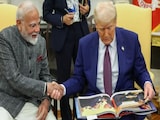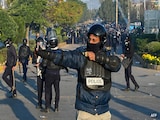Delhi Chief Minister Arvind Kejriwal today said his government would now be able to tackle pollution in a more appropriate manner with the launch of the real-time source apportionment 'supersite' here.
Mr Kejriwal inaugurated the real-time source apportionment supersite at Rouse Avenue and a mobile van.
"The real-time source apportionment supersite will share details of sources of pollution on an hourly basis as well as forecast for the next three days. The mobile van will go to a particular place and the data collected will be analysed at the supersite.
"Right now, we are launching one mobile van but soon, we will launch more. Through these mobile vans, we will be able to identify pollution hotspots and make targeted interventions," he said.
By getting information about the real-time pollution sources, the government will be able to tackle the problem in a more accurate way, the chief minister added.
Explaining himself further, Mr Kejriwal said the real-time data showed that at 8 am, pollution due to outside sources and vehicular pollution was at 35 per cent each while biomass burning was 29 per cent. At 10 am, pollution due to outside sources declined to 29 per cent, biomass burning to zero per cent and vehicular pollution to 35 per cent.
"Biomass burning sees a rise during winters. Security guards, drivers resort to burning biomass in order to keep themselves warm. This increases during the winter months," he said while reiterating that the real-time data would help tackle pollution. The government had to rely on old data on pollution earlier, he said.
He cited how steps to tackle pollution were based on years-old studies and said, "Those have no relevance. The real-time apportionment study has shown that the sources of pollution change on an hourly basis," he said.
The real-time source apportionment study is a joint venture of the Delhi Pollution Control Committee, IIT-Delhi, IIT-Kanpur and TERI. "We have been working on setting this up for the last three-four years but our efforts did not bear fruit. But we have been able to put it together in less time," he said.
The AAP government has taken several steps to reduce pollution in the national capital, the chief minister said.
"We introduced the Electric Vehicle Policy in 2020 and electric vehicle sales are the highest in Delhi. We have procured several new buses and, by 2025, 80 per cent of Delhi's bus fleet will be electric. We have a tree transplantation policy and Delhi's tree cover has risen to 23.6 per cent -- higher than the national average of 20 per cent.
"All these efforts have ensured that this year, Delhi saw only three severe air quality days," he said.
The real-time apportionment study was a part of the government's winter action plan to tackle pollution.
(Except for the headline, this story has not been edited by NDTV staff and is published from a syndicated feed.)















